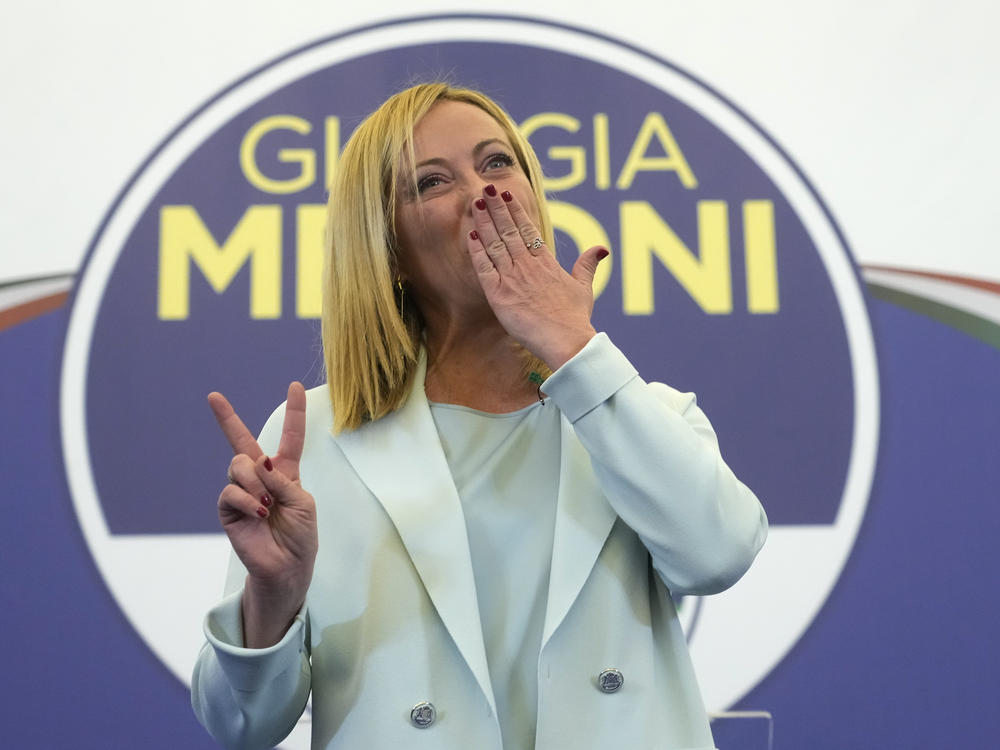Section Branding
Header Content
Results show Italy set for first far-right government since World War II
Primary Content
Updated September 25, 2022 at 9:16 PM ET
ROME — The coalition led by far-right leader Giorgia Meloni won the most votes in elections held Sunday and appears set to form Italy's first far-right government since World War II, near final results show.
Near-final results showed the center-right coalition netting some 44% of the parliamentary vote, with Meloni's Brothers of Italy party getting 26%. Her coalition partners divided up the remainder, with the anti-immigrant League of Matteo Salvini winning nearly 9% and the more moderate Forza Italia of ex-Premier Silvio Berlusconi took around 8%.
The center-left Democratic Party and its allies had around 26%, while the 5-Star Movement — which had been the biggest vote-getter in 2018 Parliamentary elections — saw its share of the vote halved to some 15% this time around.
Turnout was a historic low 64%. Pollsters suggested voters stayed home in part in protest and also because they were disenchanted by the backroom deals that had created the three governments since the previous election.
In a late night victory speech on Sunday, Meloni thanked those Italians who didn't believe what she called "lies" about her and her party. She said the result shows that most Italians want her party to lead the government. She also said she regrets so many Italians did not vote. Turnout was 64%, the lowest for a general election in almost 50 years.
"It's important to understand that if we're called to govern this nation, we will do so for all Italians," Meloni said, adding that "we will do so with the goal of uniting the people."
Fratelli d'Italia has its origins in the Italian Social Movement, which was created by supporters of fascist dictator Benito Mussolini in the aftermath of World War II.
Its leader, 45-year-old Meloni, is poised to become Italy's first female prime minister. She already has plans to form a coalition with two smaller right-wing parties: the hard-right, anti-immigrant Lega (League), led by former interior minister Matteo Salvini, and the center-right Forza Italia, led by three-time former prime minister Silvio Berlusconi.
The main center-left party, the Democratic Party (PD), conceded defeat and is set to be the largest opposition party.
Meloni has cultivated an image of a strong everywoman who criticizes "Brussels bureaucrats" and identifies with the needs of ordinary people. But as a teenager, Meloni joined the youth chapter of the Italian Social Movement, which used fantasy novels like J.R.R. Tolkien's The Lord Of The Rings to recast fascist ideas, says Guido Caldiron, an Italian journalist who covers fascism and the far right.
"Tolkien gave them new ways to talk about their ideology where they were not the bad guys but communitarians protecting their kingdoms and traditions," he says.
Most voters where she grew up reject her politics
Meloni grew up in the working-class Garbatella neighborhood in Rome, where most voters support leftist parties.
"She's definitely not part of the spirit of this neighborhood," says Michela Mancurti, a retired United Nations officer who was among a crowd of voters outside a polling station on Sunday. "Many of us are here voting to try to prevent her from winning."
But NPR did speak to a few Meloni fans, including Tiziana Pipistrello, who works in advertising. Pipistrello rolls her eyes when others in the neighborhood call Meloni a fascist.
"Enough, enough with that fascism business," she says. "That all happened a long time ago."
Parties with fascist roots are being normalized in Italy
Caldiron, the fascism expert, says politicians who belong to parties with fascist roots have been normalized in Italian politics since Berlusconi, the former prime minister, brought them into his governments.
"Meloni didn't have to do much work to convince some Italians that she won't bring back fascism in Italy," Caldiron says.
But there is concern that she could take Italy down the path of illiberal democracies such as Hungary, where longtime prime minister Viktor Orban has hollowed out democratic institutions including free courts, independent media and civil rights.
"It's not fascism but it's still a threat," Caldiron says.
Meloni's alliance with Orban has rattled EU leaders but she has stuck by the EU line on the most pressing issue: Russia's war on Ukraine. Her party has staunchly supported Ukraine's sovereignty and has approved sending weapons to Ukrainian forces. Her coalition partners, Salvini and Berlusconi, are both admirers of Russian President Vladimir Putin but have tried to distance themselves from Putin during the campaign.
Copyright 2022 NPR. To see more, visit https://www.npr.org.

